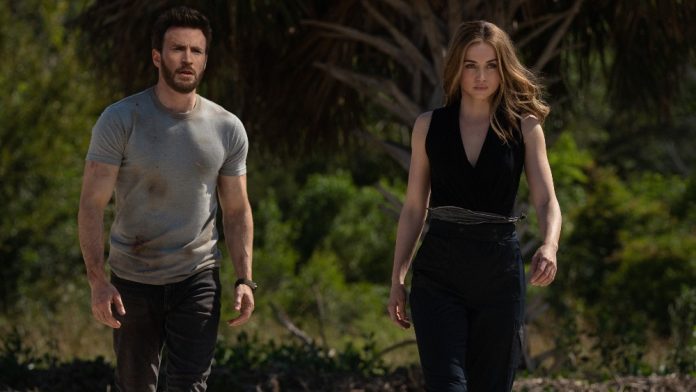The romantic action-comedy Ghosted (now streaming on Apple TV+) stars Chris Evans as Cole Turner, an Average Joe from Washington, D.C. who meets the beautiful Sadie (Ana de Armas) at the local market where he sells plants. After spending some quality time together, Sadie refuses to answer any of Cole’s texts, so he sets off to England to find her — not knowing that she’s a secret agent — and soon finds himself wrapped up in the adventure of a lifetime, one that may very well be his last.
Though the pairing of Evans and de Armas may not be too surprising given that they worked together on Rian Johnson‘s Knives Out, some might be surprised to learn that Ghosted was directed by Dexter Fletcher, who last directed the Elton John biopic Rocketman starring Taron Egerton — a film that came directly on the heels of Fletcher’s work on Bohemian Rhapsody in the wake of Bryan Singer‘s abrupt exit.
Ghosted is a change of pace for Fletcher that allows him to delve into new realms that he hasn’t been able to explore in his previous films — not just the time-tested tropes of a rom-com, but also the impressive action set pieces that permeate the film.
Above the Line spoke with Fletcher a few weeks back for the following interview, in which he discussed the film’s starry casting and shooting Albuquerque for the Middle East.
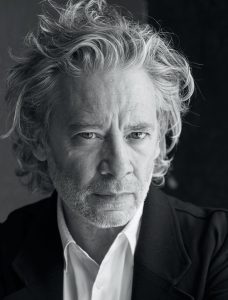
Above the Line: I know this was originally a script written by Deadpool scribes Rhett Reese and Paul Wernick of Deadpool. What was it about this project, be it the script, the cast, or simply the genre, that got you interested in making this your follow-up to Rocketman?
Dexter Fletcher: It was certainly interesting when Evans was already attached, and that’s how it sort of came to my attention. They were like, ‘Hey, this is Chris Evans’ project, and it’s got a touch of Romancing the Stone about it.’ That’s all I got, and I was excited. I read it, and I didn’t know what to expect, like you, when you sat down to watch it. I really enjoyed the fact that he was a very ordinary guy, in a lot of respects. He’s a very straightforward, uncomplicated superhero character. He’s a normal working man [who] gets dragged into this extraordinary set of circumstances where he tries to live a very safe life, but finds himself in anything but. That was exciting.
It was Chris, and it’s well known that Scarlett [Johansson] was being talked about very seriously. Unfortunately, that couldn’t work for a scheduling reason, but Ana was there and is another great friend of Chris’. He made the call, and it wasn’t like we went shopping around or anything. It was literally the next call, and she was like, ‘Hey, I’m available’ — because her Ballerina film had got pushed, so we had a window that we could get her. The planets just aligned, as they say, or the stars aligned, and we managed to get the two of them together. That was very exciting, and the writing was great. There was action, [and] I’ve always had a big desire to play in that sandbox. There were [many] ticks for me and a lot of exciting elements.
ATL: I was curious whether Chris was involved with casting Ana, because obviously, they were so great together in Knives Out. You can tell from that and this movie that they’re two actors who work really well together.
Fletcher: The great advantage of that is a.) they know each other, and b.) they’re really great friends. Even for instance, while we were setting up shots and talking about what we were going to do, they were sitting in their chairs in the corner, just laughing — about what I have no idea. They sit there and they laugh and they’re making jokes and sending each other up. That’s really healthy and fun, and it’s conducive for the film that if they’re having fun, hopefully, that transfers to the screen, and the movie is fun, and the audience can have fun — because that’s what this movie is about. It really wants to sell entertainment and fun, and you see two people and despite the fact they’re arguing relentlessly, you’re actually really enjoying that fight and that arguing. That was just another great advantage of the film.
ATL: At any time, did you see this potentially as your audition to one day direct a James Bond movie or be a part of that world? I know a lot of British filmmakers see the 007 franchise as an institution…
Fletcher: I mean, I didn’t think of it that way, but if you’re asking if that’s something I’m interested in being considered for, I’d be a liar if I said “no.” As you say, it’s a great institution, and there’s an incredibly creative and exciting opportunity to be had there. That, unfortunately, is not for me to decide. If that opportunity presents [itself], I will be more than happy, but if it doesn’t, I suppose I can ply my craft and trade elsewhere.
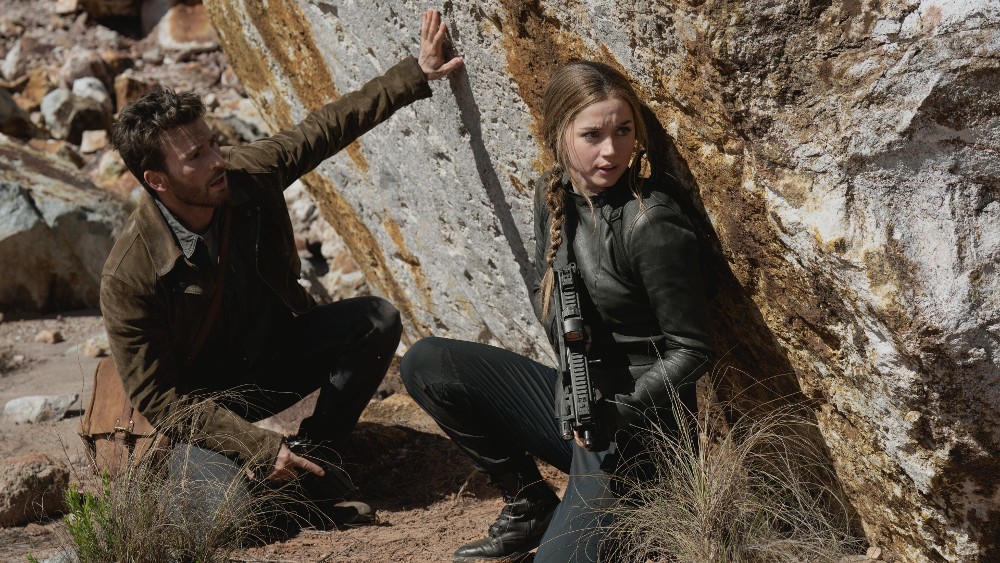
ATL: You’d done a string of biopics from Eddie the Eagle through Rocketman. Was there something fun about making something more fantasy-driven like Ghosted where you didn’t have to worry about authenticity or reality, really?
Fletcher: Yeah, yeah, exactly that. I always try to do things that will surprise [me], let alone anyone who’s watching closely what kind of choices I make. When I’m afforded opportunities to do something different from what I’ve done before, that excites me and interests me. Obviously, I have things that I love. I love my ’80s action [movies] — I love Raiders, and Midnight Run and 48 Hrs., and all these great movies from that era, and I love True Lies.
I kind of saw [Ghosted] as my opportunity to scratch that itch and really have an opportunity there, [but] I’ll pivot and move and duck and weave. Sometimes it’s a biopic, sometimes it’s a musical, and a fantasy-driven thing is great, [too]. I’d love to do more of that. I had a really good chance with this to explore and work with visual effects in a way that I’ve never done before. That was really intriguing and satisfying, [an] exciting new tool. I could add to [my] storytelling palette, if you like.
ATL: Once you had Chris and Ana, how did you go about casting around them? I mean, you have Oscar winner Adrien Brody playing your villain, while Tim Blake Nelson appears in a small role. How’d you go about putting together that cast?
Fletcher: That’s really about “who do I love, and who do I want to work with?” If you fire out the question, you see what kind of answer you get. I’m a huge Tim Blake Nelson fan and have been for many years, to the extent [that] my wife and producing partner, who worked in theater and opera for many years, was talking to Tim about doing a play Off-Broadway many years ago. We’ve known Tim for a while, and [the] same with Tate Donovan, who’s an old friend, as well as a great actor. It’s a little of, “ask your friends to work, it can’t be a bad thing.”
Tim is just such a phenomenal character actor and brings so much. If you think about the villain in Raiders, he’s really well fleshed-out, and genuinely dangerous and worrying. I think you need an actor of that caliber effectively for a one-scene moment to really make an imprint and an impression. It’s Cole’s first moment in real danger, so it had to have all the weight Tim could bring.
ATL: Spy movies like Bond or Bourne are often shot in all these different locations, so did you actually get to shoot Ghosted on location in Washington D.C. and London?
Fletcher: Those places we did, absolutely. There was a real push to go to London, which I’m really happy we did because it looks so beautiful. It’s my hometown, and that was a really good way to end the movie. The same with D.C. My wife [Dalia Ibelhauptaitė] and I, again, on a Thanksgiving weekend, when everyone said, ‘Oh, we’re all on holiday.’ We said, ‘Okay,’ so we went to D.C. and had a wander around and found the canals and the museums and the Exorcist steps and all this stuff we tried to use — the more unusual, unknown corners of D.C. You know the Capitol Building and the [Washington] Monument and all that stuff that is great, but I wanted to find something a bit more “The Road Less Traveled,” as it were.
ATL: What about the Middle East scenes? Where did you shoot that stuff?
Fletcher: Do you mean Albuquerque?
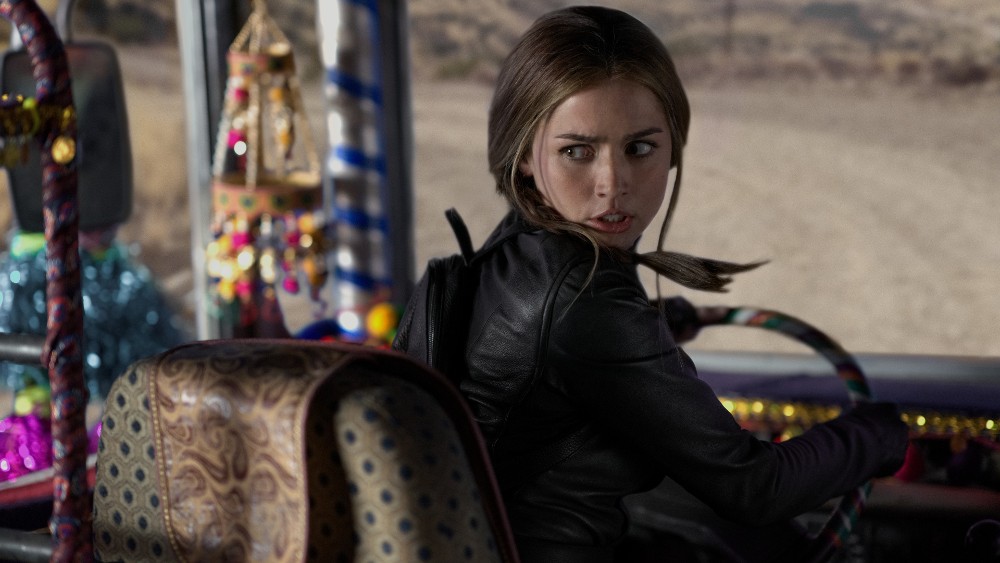
ATL: Oh, is that where that was? I’ve never been to the Middle East but I’ve been to Albuquerque, so was that where that action scene on the bus was filmed?
Fletcher: A lot of it’s in Albuquerque. Some of it’s in a quarry just outside of Atlanta. We were based in Atlanta. It’s the wizardry and what I was saying about visual effects. I’m loath to reveal it because the guys did such a seamless job [in] my mind. There are a couple of well-designed shots that are all about selling that place, and once I realized what was possible with that, I created those shots so that we had a really big impactful… when he comes out of the cave, and we wrap around him, that’s a very important moment, because it has real impact. We think he’s somewhere else, as he does. I think, as much as we [would’ve] liked to have gone there, it might have been complicated.
ATL: This is the second time this year I’ve been fooled by Atlanta. There must be a good reason why everyone makes their movies down there — it can obviously pass for a number of places…
Fletcher: The marketplace where she meets her ex-boyfriend, that’s all [on] the backlot in Atlanta as well.
ATL: I don’t want to spoil any of the cameos, obviously, but it makes a lot more sense that you could have made those happen in Atlanta than it would be to fly some of those actors to the Middle East for a one-day shoot since some of them would be in Atlanta anyway.
Fletcher: Some of them flew in. I would rather keep the illusion that we went to the Middle East because I think that’s a lot of the fun of the movie, and I genuinely hope that people, before they go looking for any sort of behind-the-scenes stuff or any other kind of material on it, that they watch the movie first and enjoy that experience. And then maybe wait and search that other stuff out after.
ATL: This is for Above the Line, which is the sister site of Below the Line, and both sites are aimed at the industry and those who actually make movies, so we talk to many production designers and visual effects workers about that movie magic, which is definitely present in Ghosted.
Fletcher: There’s a brilliant visual effects supervisor called Mike Wassel, and that’s a triumph for him and his department, and the same with Claude Paré, the production designer, and how they collaborated, and how they helped me realize all these incredible places around the world so seamlessly and convincingly. They’re masters of their job[s], and I was very lucky to be working with them.
ATL: While I do love movie magic, especially when it’s done so well, as it is here, I also tend to like knowing how it’s done.
Fletcher: Absolutely. I agree. I’m the same, and I know there’s a propensity to put out a lot of material prior. For me, that’s putting the cart before the horse. I think you want to give the magic [but] keep the spectacle of surprise, and then maybe go and find out that after.
ATL: I also enjoyed some of the song choices, like using Blur when the movie goes to London. That was pretty perfect. Then, I read the end credits and saw who your music supervisors were, and you had two of the biggest in the biz between Randall Poster and George Drakoulias. Were a lot of those songs your idea or did they come out of brainstorming sessions with the two of them?
Fletcher: Some of them were my ideas, some were the people that the producers put in front of me and say, ‘You should see these guys,’ and then you meet them, and look at what they’ve done, [and] you go, ‘That would be really amazing.’ It’s one of the great advantages and joys of as you climb the slippery pole of success and your budgets get bigger, and the resources are there, that obviously you get very experienced people to work with, and they want to come on board. Given the success of things like Rocketman and Eddie the Eagle and Bohemian, people are interested and keen to work with me as well. That’s a byproduct of that. Or [there are] those people [who say], ‘I really love that person’s work? Can I meet them?’ And now they meet me, which is really great.
ATL: Another one of the benefits with Rocketman is that you had Elton involved, so it was much easier to get the songs, I assume.
Fletcher: It was in conjunction with his production company, as well, so there was a vested interest in it for them. They’d had that project for a few years that they’d wanted to realize, and then everything came together with Taron [Egerton], really.
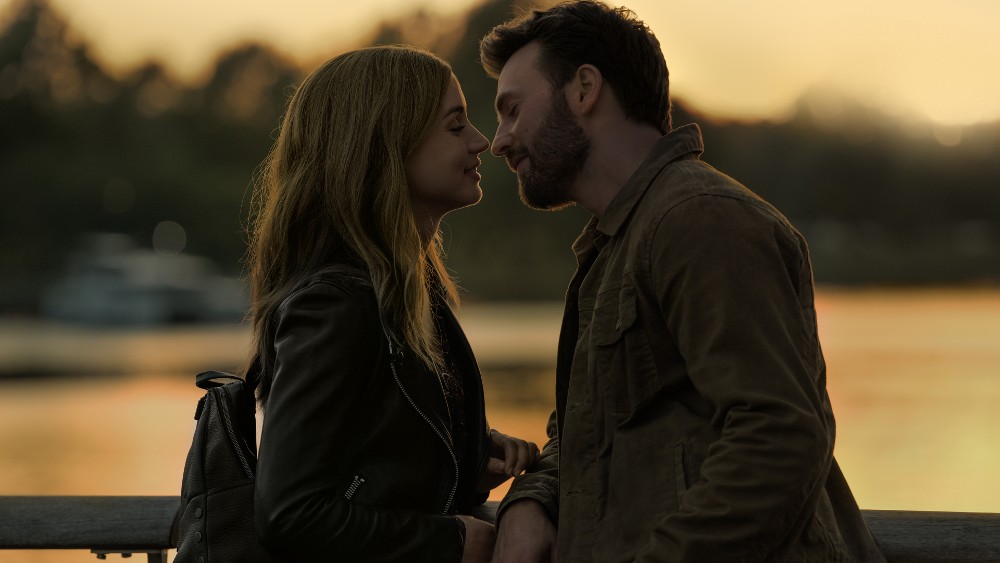
ATL: I do want to get back to that action scene I mentioned earlier. I generally prefer to watch movies like this in theaters, but one of the advantages of watching a screener is that I can watch something more than once. In fact, I did that with that bus scene, watching it three or four times, because it was so different from other modern action scenes. I was just so interested in trying to figure out how you did it, as it had some of that Raiders spirit you mentioned earlier.
Fletcher: Blatantly, it was too good an opportunity to miss. Once we put the bars on the back window, I said, ‘I’ve got to do this. It’s gonna be great and we have to celebrate and be fun.’ To tip your hat to someone like Spielberg, I don’t think is a cheap shot at all in my book. That’s one of the greatest filmmakers of all time and [one of the] greatest action sequences. I was proud to do it.
ATL: Is any of that in the script, as far as what the action entails, or is it very vague on purpose in order to give you some wiggle room to experiment?
Fletcher: It’s fairly vague. [With] the dialogue, the arguments are in the script, but how it develops, it’s really me and Garrett Warren, the second unit director and stunt arranger. That’s really born of pre-vis and working with Mike Wassel, the visual effects [supe]. We kind of get together and start thrashing ideas, ‘Oh, that’ll be good.’
Of course, there’s a much longer version of it. I could probably show you a cut that has even more action in it, but I’m also one for not wanting things to outstay their welcome. Pace is very important to me, and rhythm. I understand [why] action is so great, but like a good musical number, I don’t want it to outstay its welcome.
I think once the audience understands, ‘Oh, they got to this certain point.’ That’s what that sequence is about — when he hits the guy and he goes out the door. That moment where the camera pushes in on his face — dramatically anyway — there’s a longer version of it, but it was an absolute joy to devise it and work on it and hear ideas and give ideas, as it is.
ATL: There’s another scene where it seems like you have 100 assassins going after the two of them, so was that just about getting a casting director who knows how to find so many tough-looking background actors?
Fletcher: Garrett Warren, again, the second unit director. I was very specific with him, and we really loved this idea. It really cooked up out of the idea at the end — we kept drawing and going back to it, and they did some passes on the draft. I got as eclectic a mix as possible — big, small, men, women, small, round. Again, it was just about trying to make all of Leveque’s men very buttoned-up and uniformed and smart and straight, and then having the diverse mix of bounty hunters. It was a lot of fun.
ATL: I was actually looking for you, and I saw in the credits that you’re listed as someone named Raoul. I wasn’t sure if that was the London cabbie…
Fletcher: No, the cabbie is a lovely actor named Burn Gorman. He’s in a great show I did called The Offer. No, Raoul is in the trunk of the car right at the end. It’s a blink-and-you-miss-it moment, and it’s intentionally dark and shadowy. I was in a nice pair of silk pajamas.
ATL: At one point, were you going to direct a Sherlock Holmes movie?
Fletcher: Yeah, I was talking to Robert [Downey, Jr.] about that. That was not long after Rocketman, actually. That was happening, and then COVID hit and that kind of derailed that process, and now, I think trying to pin down Robert and Jude [Law] and get all those components [and] parts together at the same time is proving nigh impossible at the moment. We worked on it very closely, and he’s a genius, and there’s no other word for him, really.
Ghosted is now streaming on Apple TV+.


